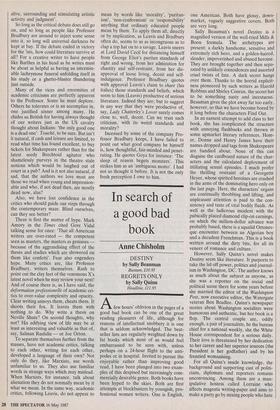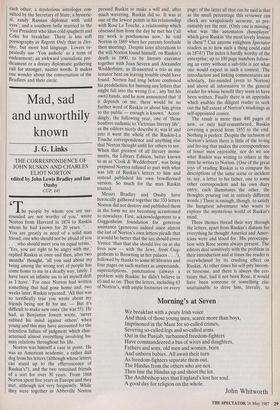In search of a good bad book
Anne Chisholm
DESTINY by Sally Beauman
Bantam, £10.95
REGRETS ONLY by Sally Quinn
Headline, fl 1 .95
Afew hours' oblivion in the pages of a good bad book can be one of the great reading pleasures of life, although for reasons of intellectual snobbery it is one that is seldom acknowledged. The best- seller lists are regularly weighted down by fat books which most of us would feel embarrassed to be seen with, unless perhaps on a 24-hour flight to the anti- podes or in hospital. Invited to pursue the enjoyable rather than improving good read, I have been plunged into two exam- ples of this despised but increasingly com- mercially desirable genre. Both books have been hyped to the skies. Both are first attempts at blockbusters by youngish, pro- fessional women writers. One is English, one American. Both have glossy, down- market, vaguely suggestive covers. Both are very long.
Sally Beauman's novel Destiny is a magnified version of the well-tried Mills & Boon formula. The archetypes are present: a darkly handsome, sensitive and extremely rich hero, and a golden-haired, slender, impoverished and abused heroine.
They are brought together and then sepa- rated by unlikely coincidences and assorted cruel twists of fate. A dark secret hangs over them. Thanks to the horrid explicit- ness pioneered by such writers as Harold Robbins and Shirley Conran, the secret has to be something nasty and incestuous. Beauman gives the plot away far too early, however, so that we have become bored by it long before the characters Find Out.
In an earnest attempt to add class to her book, she has complicated the structure with annoying flashbacks and thrown in some upmarket literary references. Hom- er, Donne and Henry James have their names dropped and tags from Shakespeare are bandied about. None of this can disguise the cardboard nature of the char- acters and the calculated deployment of titillating sexual episodes. I much prefer the thrilling restraint of a Georgette Heyer, whose spirited heroines are crushed in the arms of the dominating hero only on the last page. Here, the characters' organs are continually throbbing and lifting, and unpleasant attention is paid to the con- sistency and taste of vital bodily fluids. As well as the ludicrous incident with the pubically placed diamond clip-on earnings, on which the million-dollar advance was probably based, there is a squalid Ortones- que encounter between an Algerian boy and a decadent Frenchman. This is a book written around the dirty bits, for all its veneer of romance and culture.
However, Sally Quinn's novel makes Destiny seem like literature. It purports to take the lid off power, politics and journal- ism in Washington, DC. The author knows as much about the subject as anyone, as she was a reporter on the social and political scene there for some years before she married the editor of the Washington Post, now executive editor, the Watergate veteran Ben Bradlee. Quinn's newspaper stories about Washington socialites were humorous and authentic, but her book is a flop. The central couple are, oddly enough, a pair of journalists, he the bureau chief for a national weekly, she the White House correspondent for a serious daily. Their love is threatened by her dedication to her career and her superior sources (the President is her godfather) and by his frenzied womanising.
For all Quinn's inside knowledge, the background and supporting cast of politi- cians, diplomats and reporters remains unconvincing. Among them are a man- ipulative hostess called Lorraine who affects magenta writing-paper and aims to make a party go by mixing people who hate each other; a mysterious astrologer con- sulted by the Secretary of State; a hysteric- al, randy Russian diplomat with 'cold eyes'; and a southern belle married to the Vice President who likes cold spaghetti and Coke for breakfast. There is less soft pornography in Regrets Only than in Des- tiny, but more bad language. Lovers re- peatedly use 'You asshole' as a term of endearment; an awkward journalistic pre- dicament or a dreary diplomatic gathering call for stronger, nastier words. It makes one wonder about the conversation of the Bradlees and their circle.





















































 Previous page
Previous page